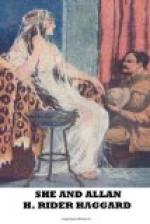“Is it thus?” said Umslopogaas quietly. “And if so, will he be named Lousta?”
Then his smouldering wrath broke out and in a kind of roaring voice he went on,
“What have I done that the wives of my bosom should be my betrayers, those who would give me to death? Zinita betrayed me to Dingaan and in reward was slain, and my children with her. Now would you, Monazi, betray me to Cetywayo—though in truth there is naught to betray? Well, if so, bethink you and let Lousta bethink him of what chanced to Zinita, and of what chances to those who stand before the axe of Umslopogaas. What have I done, I say, that women should thus strive to work me ill?”
“This,” answered Monazi with a mocking laugh, “that you have loved one of them too well. If he would live in peace, he who has wives should favour all alike. Least of anything should he moan continually over one who is dead, a witch who has left a curse behind her and thus insulted and do wrong to the living. Also he would be wise to attend to the matters of his own tribe and household and to cease from ambitions that may bring him to the assegai, and them with him.”
“I have heard your counsel, Wife, so now begone!” said Umslopogaas, looking at her very strangely, and it seemed to me not without fear.
“Have you wives, Macumazahn?” he asked of me in a low voice when she was out of hearing.
“Only among the spirits,” I answered.
“Well for you then; moreover, it is a bond between us, for I too have but one true wife and she also is among the spirits. But go rest a while, and later we will talk.”
So I went, leaving the Chief to his business, thinking as I walked away of a certain message with which I was charged for him and of how into that message came names that I had just heard, namely that of a man called Lousta and of a woman called Monazi. Also I thought of the hints which in her jealous anger and disappointment at her lack of children, this woman had dropped about a plot against him who sat on the throne of Chaka, which of course must mean King Cetywayo himself.
I came to the guest-hut, which proved to be a very good place and clean; also in it I found plenty of food made ready for me and for my servants. After eating I slept for a time as it is always my fashion to do when I have nothing else on hand, since who knows for how long he may be kept awake at night? Indeed, it was not until the sun had begun to sink that a messenger came, saying that the Chief desired to see me if I had rested. So I went to his big hut which stood alone with a strong fence set round it at a distance, so that none could come within hearing of what was said, even at the door of the hut. I observed also that a man armed with an axe kept guard at the gateway in this fence round which he walked from time to time.
The Chief Umslopogaas was seated on a stool by the door of his hut with his rhinoceros-horn-handled axe which was fastened to his right wrist by a thong, leaning against his thigh, and a wolfskin hanging from his broad shoulders. Very grim and fierce he looked thus, with the red light of the sunset playing on him. He greeted me and pointed to another stool on which I sat myself down. Apparently he had been watching my eyes, for he said,




